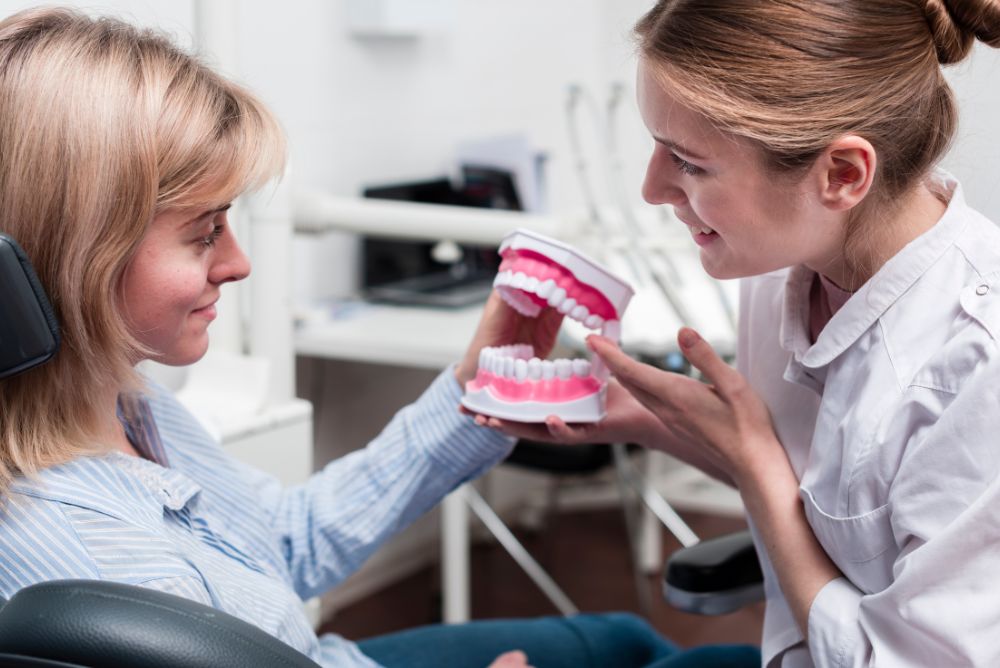If you have lost teeth, you may be wondering about dentures. Dentures are custom dental prostheses that replace lost teeth and improve the function of your mouth so you can eat, talk, and smile with comfort. There are various types of dentures for replacement of teeth; however, the two most common are partial dentures Calgary and full dentures.
What Are Dentures?
Dentures are false teeth constructed by a denturist. They rest on the gums and take the place of your lost teeth. Modern dentures look natural in your mouth and can feel comfortable, too. Dentures can be made of acrylic, metal, or a combination of the two.
Dentures are good for:
- Replacing missing teeth
- Restoring chewing function
- Improving speech
- Supporting facial structure
What Are Partial Dentures?
Partial dentures are used when you have natural teeth remaining in your mouth. The denturist makes partial dentures to fill in the spaces where teeth are missing while leaving the remaining teeth in place.
Partial dentures usually have a base of acrylic or metal that holds the false teeth and some small clasps or attachments to secure the partial denture to your natural teeth.
Partial dentures are good for:
- People missing a few teeth in one or both jaws.
- Preventing nearby teeth from shifting.
- Restoring function without removing all teeth.
What Are Full Dentures?
Full dentures, or complete dentures, are used when you are missing all your teeth in your upper jaw and/or lower jaw. A full denture replaces an entire set of teeth or arch.
A full denture sits on the gum and bone of the jaw. Upper dentures cover the roof of the mouth for better support, while lower dentures are shaped to fit around the tongue.
Full dentures are good for:
- Patients who have lost all teeth in one arch.
- Providing full support for chewing and speaking.
- Restoring appearance when no natural teeth remain.
Difference Between Partial and Full Dentures
Here is a simple chart to show the differences:
| Feature | Partial Dentures | Full Dentures |
| Teeth present | Some natural teeth remain | No natural teeth in the jaw |
| Support | Supported by natural teeth and gums | Supported fully by gums and bone |
| Use | Replaces one or more missing teeth | Replaces all teeth in an arch |
| Stability | Uses clasps/attachments to stay in place | Relies on fit and suction (upper denture) |
| Common patients | People with gaps between natural teeth | People with complete tooth loss |
Which Type of Denture Is Best?
The best option will depend on your dental situation:
- If you still have healthy, strong natural teeth, partial dentures may be a better option. Number one, it’s less invasive, and number two, obviously you will make use of the teeth that still remain.
- If you have lost all of your teeth in one or both arches, there will be no other option but full dentures.
Your denturist will evaluate your mouth and let you know which type of dentures would be most suitable.
Wrapping Up
Dentures are safe as well as an effective way to replace missing teeth. The main difference between partial and full dentures comes down to how many natural teeth you actually have remaining.
- Partial dentures are a good solution if you only require a replacement of one or two missing teeth.
- Full dentures are a good solution when you have lost all of your teeth in an arch.
Both types of dentures can help with chewing, speech, and appearance. If you are unsure which type of denture solution is best for your situation, ask a denturist. They are a professional who can guide you on the best types of dentures for tooth replacement based on your oral needs.
Restore Your Confident Smile With Custom Dentures Today
North East Denture Clinic provides complete and partial dentures that fit comfortably and assist in restoring your smile. Our Calgary denturist uses modern dental technology to replace missing teeth, allowing you to chew, speak, and smile confidently. Please give us a phone call to schedule an appointment with a denturist professional.

